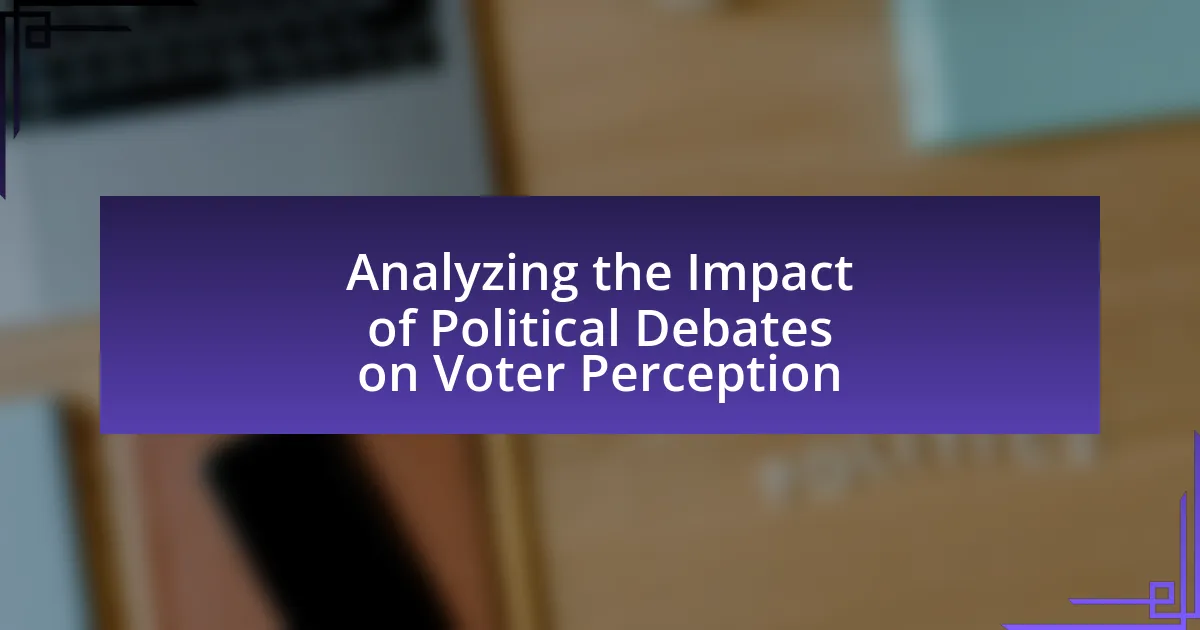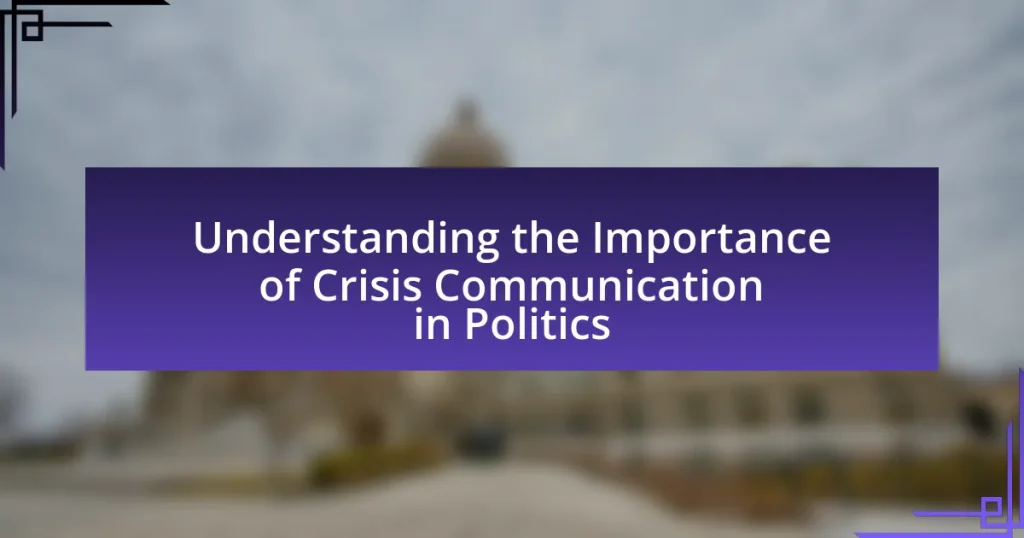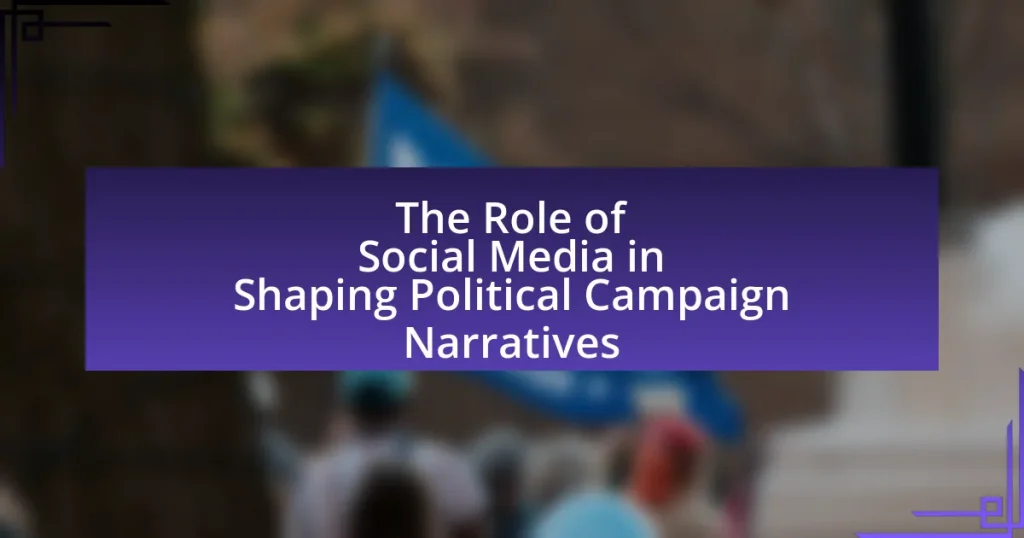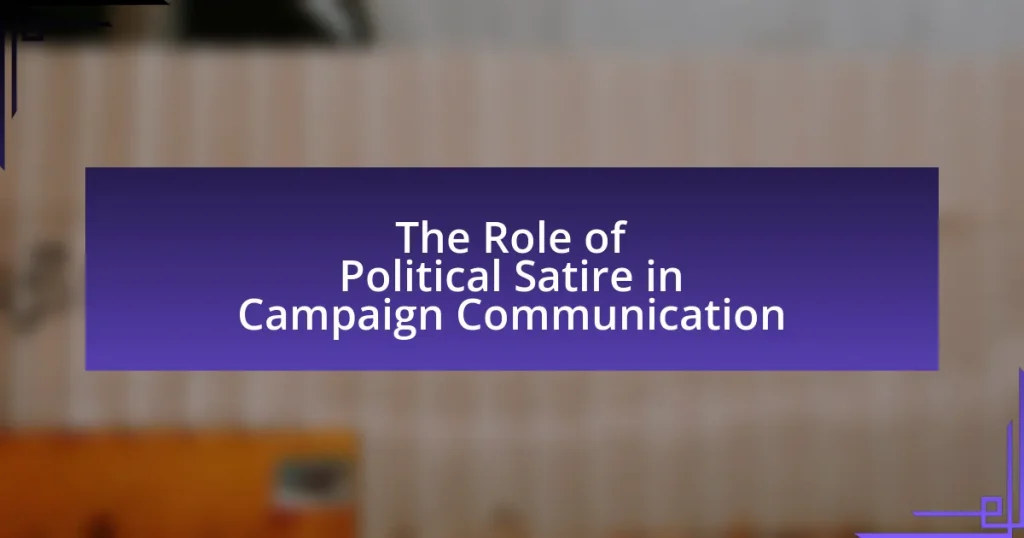The article analyzes the impact of political debates on voter perception, highlighting how these events shape opinions, clarify candidate positions, and influence emotional responses. It discusses the psychological factors at play, such as cognitive biases and social identity, and examines how candidates’ performances and debate formats affect voter evaluations. Additionally, the article explores the role of media coverage and social media in shaping perceptions post-debate, as well as the consequences of debates on voter behavior and turnout. Key findings indicate that debates significantly enhance voter engagement and can sway undecided voters, ultimately impacting electoral outcomes.
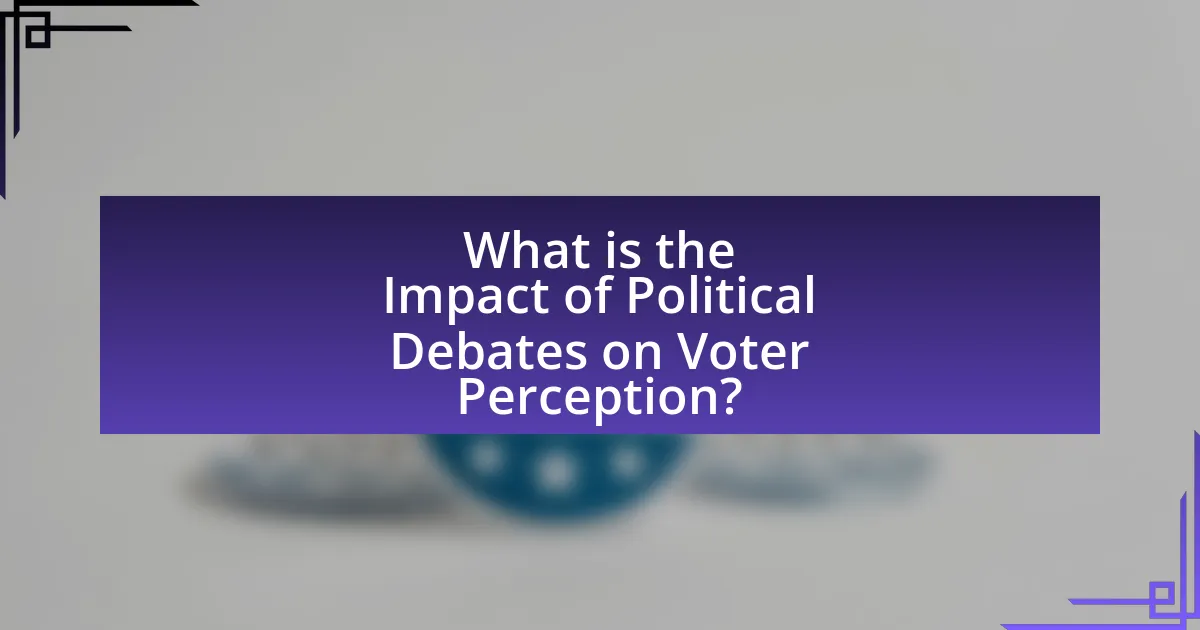
What is the Impact of Political Debates on Voter Perception?
Political debates significantly influence voter perception by shaping opinions, highlighting candidate positions, and affecting emotional responses. Research indicates that debates serve as critical platforms where candidates can articulate their policies and counter opponents, leading to shifts in voter attitudes. For instance, a study by the Pew Research Center found that 67% of viewers reported that debates helped them better understand the candidates’ positions, while 54% stated that debates influenced their voting decisions. This demonstrates that the content and delivery of debates can alter public perception and ultimately impact electoral outcomes.
How do political debates influence voter opinions?
Political debates significantly influence voter opinions by shaping perceptions of candidates’ competence, policies, and character. During debates, candidates present their views and respond to opponents, which allows voters to evaluate their positions and communication skills. Research indicates that 67% of viewers report changing their opinions about candidates after watching a debate, highlighting the debates’ role in informing and swaying public perception. Additionally, debates can reinforce existing beliefs or introduce new information, impacting voter decision-making processes.
What psychological factors are at play during political debates?
Psychological factors at play during political debates include cognitive biases, emotional responses, and social identity influences. Cognitive biases, such as confirmation bias, lead participants and viewers to favor information that aligns with their pre-existing beliefs, affecting their perception of candidates. Emotional responses, including fear and enthusiasm, can significantly sway audience reactions and opinions, as evidenced by studies showing that emotionally charged statements resonate more with voters. Additionally, social identity influences, where individuals align their views with their perceived group affiliations, shape how candidates are evaluated, as demonstrated in research indicating that voters often prioritize party loyalty over individual candidate qualities.
How do candidates’ performances affect voter perceptions?
Candidates’ performances significantly influence voter perceptions by shaping opinions on their competence, credibility, and relatability. For instance, research conducted by the Pew Research Center in 2020 found that 67% of voters reported that a candidate’s debate performance impacted their voting decision. Effective communication, clarity of policy positions, and the ability to engage with opponents during debates can enhance a candidate’s image, leading to increased support. Conversely, poor performances can lead to negative perceptions, diminishing voter confidence and support.
Why are political debates significant in the electoral process?
Political debates are significant in the electoral process because they provide a platform for candidates to present their policies, engage with opponents, and directly address voter concerns. This interaction allows voters to evaluate candidates’ communication skills, critical thinking, and ability to handle pressure, which are essential traits for leadership. Research indicates that debates can influence voter perceptions and decisions; for instance, a study by the Pew Research Center found that 67% of debate watchers reported that the debates helped them make a more informed choice in the 2020 presidential election. Thus, political debates play a crucial role in shaping public opinion and ultimately impacting electoral outcomes.
What role do debates play in shaping public discourse?
Debates play a crucial role in shaping public discourse by providing a platform for the exchange of ideas and viewpoints among candidates, which influences voter perceptions and opinions. Through structured discussions, debates allow candidates to articulate their policies and respond to opponents, thereby informing the electorate about key issues. Research indicates that debates can significantly impact voter decision-making; for instance, a study by the Pew Research Center found that 63% of debate watchers reported that the debates helped them understand the candidates’ positions better. This exchange not only enhances public knowledge but also fosters civic engagement by encouraging voters to participate in discussions about political issues.
How do debates compare to other forms of political communication?
Debates are a distinct form of political communication that emphasize direct confrontation of ideas, allowing candidates to articulate their positions in real-time, which contrasts with other forms such as speeches or advertisements that are typically pre-scripted and controlled. In debates, candidates face each other, providing an opportunity for immediate rebuttal and interaction, which can lead to more dynamic exchanges and clearer distinctions between their policies. Research indicates that debates significantly influence voter perception; for instance, a study by the Pew Research Center found that 67% of viewers reported that debates helped them better understand candidates’ positions compared to other formats. This immediacy and engagement in debates can lead to shifts in public opinion, making them a critical component of the electoral process.
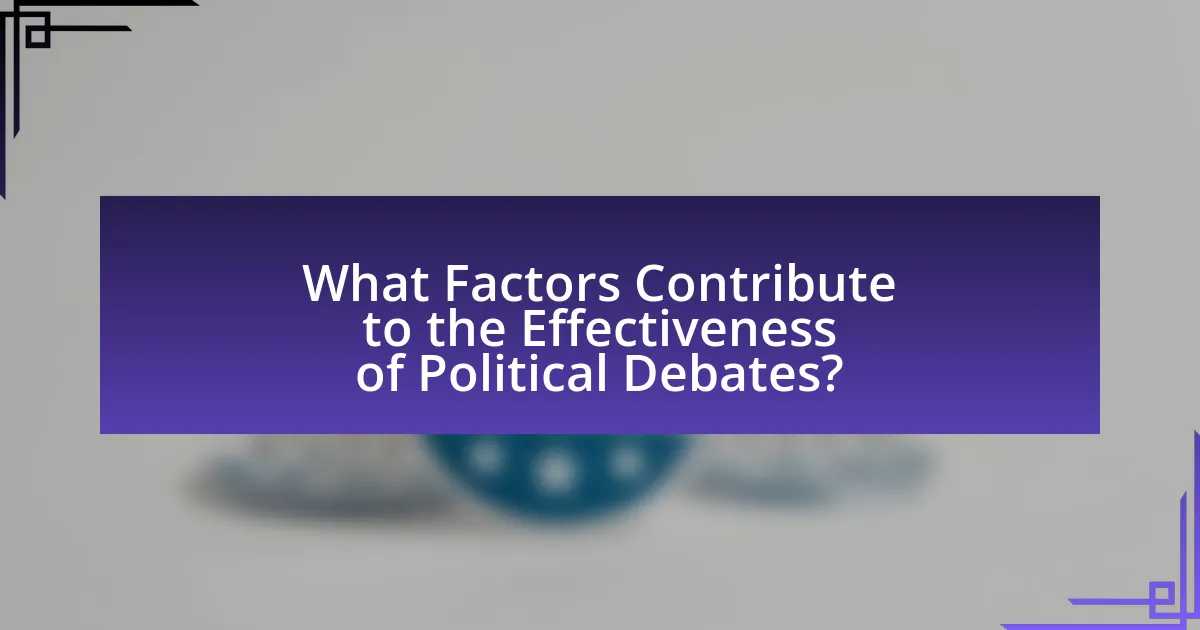
What Factors Contribute to the Effectiveness of Political Debates?
The effectiveness of political debates is primarily influenced by the clarity of candidates’ messages, their ability to engage with the audience, and the format of the debate itself. Clear messaging allows candidates to communicate their policies and positions effectively, which is crucial for voter understanding. Engagement with the audience, including body language and responsiveness to questions, enhances relatability and trust. Additionally, the debate format, whether it includes direct questioning, rebuttals, or audience interaction, can significantly impact how information is conveyed and perceived. Research indicates that debates with structured formats tend to yield higher viewer retention and comprehension, thereby influencing voter perception more effectively.
How does the format of a debate impact voter perception?
The format of a debate significantly impacts voter perception by influencing how candidates are evaluated on their communication skills, policy positions, and overall likability. For instance, structured formats, such as town hall meetings, allow for direct interaction with voters, fostering a sense of connection and relatability, which can enhance a candidate’s appeal. Conversely, highly controlled formats, like traditional podium debates, may limit spontaneity and reduce the opportunity for candidates to showcase their personality, potentially leading to a more superficial evaluation by voters. Research indicates that debates with a more conversational format can lead to higher viewer engagement and retention of information, ultimately shaping voter opinions more effectively.
What are the different formats of political debates?
The different formats of political debates include traditional one-on-one debates, town hall meetings, panel discussions, and online debates. Traditional one-on-one debates typically feature two candidates discussing various topics in a structured format, often moderated by a neutral party. Town hall meetings allow candidates to engage directly with voters, answering questions in an informal setting. Panel discussions involve multiple candidates or experts discussing issues, providing a broader perspective. Online debates utilize digital platforms, enabling real-time interaction and engagement with a wider audience. Each format influences voter perception by shaping the candidates’ public image and communication style.
How does audience engagement affect the outcome of debates?
Audience engagement significantly influences the outcome of debates by shaping the perceptions and reactions of both participants and viewers. High levels of audience engagement can lead to increased emotional responses, which often sway undecided voters and reinforce the opinions of those already aligned with a candidate. Research indicates that debates with active audience participation, such as applause or reactions, can create a more favorable atmosphere for the candidate who receives the most positive engagement, thereby impacting their perceived performance. For instance, a study by the Pew Research Center found that candidates who effectively engage the audience tend to be viewed more favorably, which can translate into higher polling numbers post-debate.
What role does media coverage play in shaping perceptions post-debate?
Media coverage significantly influences perceptions post-debate by framing the narrative and highlighting specific moments that resonate with audiences. This framing can shape public opinion by emphasizing particular candidates’ strengths or weaknesses, as evidenced by studies showing that media portrayal often sways undecided voters. For instance, a study by the Pew Research Center found that 62% of viewers reported changing their opinions based on media analysis following a debate. Thus, the way media presents information can create lasting impressions that affect voter behavior and decision-making.
How do media narratives influence voter opinions?
Media narratives significantly influence voter opinions by shaping perceptions of candidates and issues through selective framing and emphasis. For instance, studies have shown that the way media presents political debates can alter public perception; a report by the Pew Research Center found that 62% of viewers’ opinions about candidates were swayed by the media’s portrayal of debate performances. This influence occurs as media outlets highlight specific moments, quotes, or themes, which can lead to a biased understanding of a candidate’s capabilities or policies. Consequently, voters often rely on these narratives to form their opinions, demonstrating the powerful role of media in the political landscape.
What are the effects of social media on debate perception?
Social media significantly influences debate perception by shaping public opinion and framing narratives. Research indicates that platforms like Twitter and Facebook amplify certain viewpoints, often leading to echo chambers where users are exposed primarily to information that aligns with their pre-existing beliefs. A study by the Pew Research Center found that 62% of adults get news from social media, which can skew perceptions of debates by prioritizing sensational content over factual reporting. Additionally, social media facilitates real-time reactions and commentary, which can alter viewers’ interpretations of candidates’ performances during debates, as seen in the immediate feedback loops created by hashtags and trending topics.
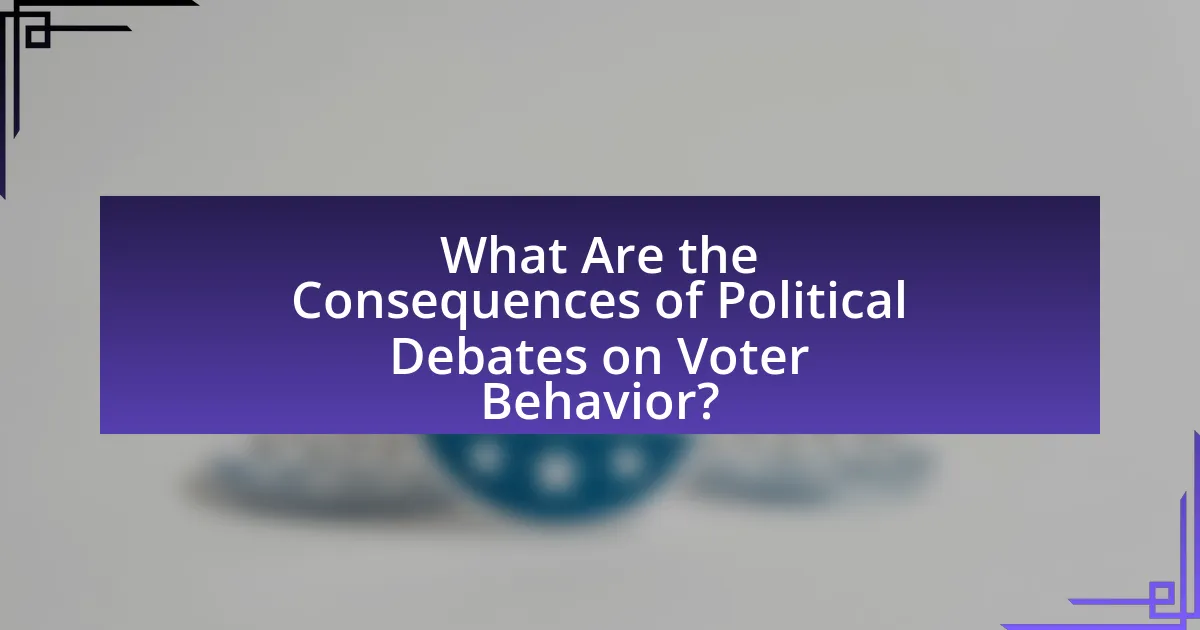
What Are the Consequences of Political Debates on Voter Behavior?
Political debates significantly influence voter behavior by shaping perceptions, preferences, and decision-making processes. Research indicates that debates can enhance voter engagement, with studies showing that approximately 60% of viewers report increased interest in candidates after watching a debate. Additionally, debates often serve as a platform for candidates to clarify their positions, which can sway undecided voters; for instance, a study by the Pew Research Center found that 40% of undecided voters changed their preferences based on debate performances. Furthermore, debates can reinforce existing biases, as voters tend to favor candidates who align with their pre-existing beliefs, leading to polarization. Overall, the consequences of political debates on voter behavior are profound, affecting both engagement levels and electoral outcomes.
How do debates affect voter turnout?
Debates significantly influence voter turnout by increasing public engagement and interest in the electoral process. Research indicates that televised debates can enhance voter awareness and motivate individuals to participate in elections. For instance, a study by the Pew Research Center found that 67% of debate viewers reported being more likely to vote as a result of watching the debates. This heightened engagement often leads to increased turnout, particularly among undecided voters who may feel more informed and compelled to make a decision after viewing the candidates’ performances.
What demographic factors influence the impact of debates on turnout?
Demographic factors such as age, education level, income, and race significantly influence the impact of debates on voter turnout. Younger voters, particularly those aged 18-29, tend to be more influenced by debates, as they are often seeking information to make informed choices. Higher education levels correlate with increased engagement in debates, leading to higher turnout rates, as educated individuals are more likely to understand the issues discussed. Income also plays a role; individuals with higher incomes may have more access to information and resources that encourage participation. Additionally, racial and ethnic minorities may respond differently to debates based on representation and relevance of issues discussed, affecting their motivation to vote. Studies have shown that these demographic factors can lead to varying levels of engagement and turnout, highlighting the importance of tailoring debate content to resonate with diverse audiences.
How do debates sway undecided voters?
Debates sway undecided voters by providing a platform for candidates to present their policies and personalities directly to the electorate. This direct engagement allows voters to compare candidates in real-time, influencing their perceptions based on performance, clarity of message, and relatability. Research indicates that 70% of undecided voters report that debates help them make a decision, as they can observe candidates’ responses to questions and their demeanor under pressure, which can significantly impact voter trust and confidence.
What strategies can candidates use to enhance their debate performance?
Candidates can enhance their debate performance by employing strategies such as thorough preparation, effective communication, and audience engagement. Thorough preparation involves researching the debate topics, understanding opposing viewpoints, and anticipating questions, which allows candidates to present informed arguments. Effective communication includes clear articulation of ideas, maintaining eye contact, and using appropriate body language to convey confidence and credibility. Audience engagement can be achieved by addressing the audience directly, using relatable examples, and responding to audience reactions, which helps to create a connection and make the candidate’s message more impactful. These strategies are supported by studies indicating that well-prepared candidates who communicate effectively and engage with the audience tend to leave a more favorable impression on voters, thereby influencing voter perception positively.
How can candidates prepare effectively for debates?
Candidates can prepare effectively for debates by conducting thorough research on relevant topics, practicing their speaking skills, and anticipating opponents’ arguments. Researching current issues, policies, and voter concerns allows candidates to provide informed responses and demonstrate expertise. Practicing speaking skills, including clarity and body language, enhances their delivery and confidence. Additionally, anticipating opponents’ arguments enables candidates to formulate counterarguments, making them more persuasive. Studies show that well-prepared candidates tend to perform better in debates, positively influencing voter perception and engagement.
What common mistakes should candidates avoid during debates?
Candidates should avoid common mistakes such as failing to prepare adequately, which can lead to poor performance and miscommunication of their policies. Inadequate preparation often results in candidates being unable to answer questions effectively or provide coherent arguments, diminishing their credibility. Additionally, candidates should avoid personal attacks on opponents, as this can alienate voters who prefer constructive dialogue. Research indicates that debates characterized by respectful exchanges tend to enhance candidates’ appeal to undecided voters. Furthermore, candidates should refrain from using jargon or overly complex language, as this can confuse the audience and detract from their message. Clear communication is essential for voter understanding and engagement.
What are best practices for voters to critically analyze political debates?
Voters can critically analyze political debates by focusing on key elements such as candidates’ arguments, evidence presented, and their overall demeanor. First, voters should identify the main points made by each candidate, assessing the clarity and relevance of their arguments. For instance, a study by the Pew Research Center found that voters who actively engage with debate content are more likely to retain information and form informed opinions. Additionally, evaluating the evidence provided by candidates, including statistics and examples, helps voters determine the credibility of claims. Observing candidates’ body language and tone can also reveal their confidence and sincerity, which are important factors in voter perception. By employing these practices, voters can make more informed decisions based on a comprehensive understanding of the debates.
